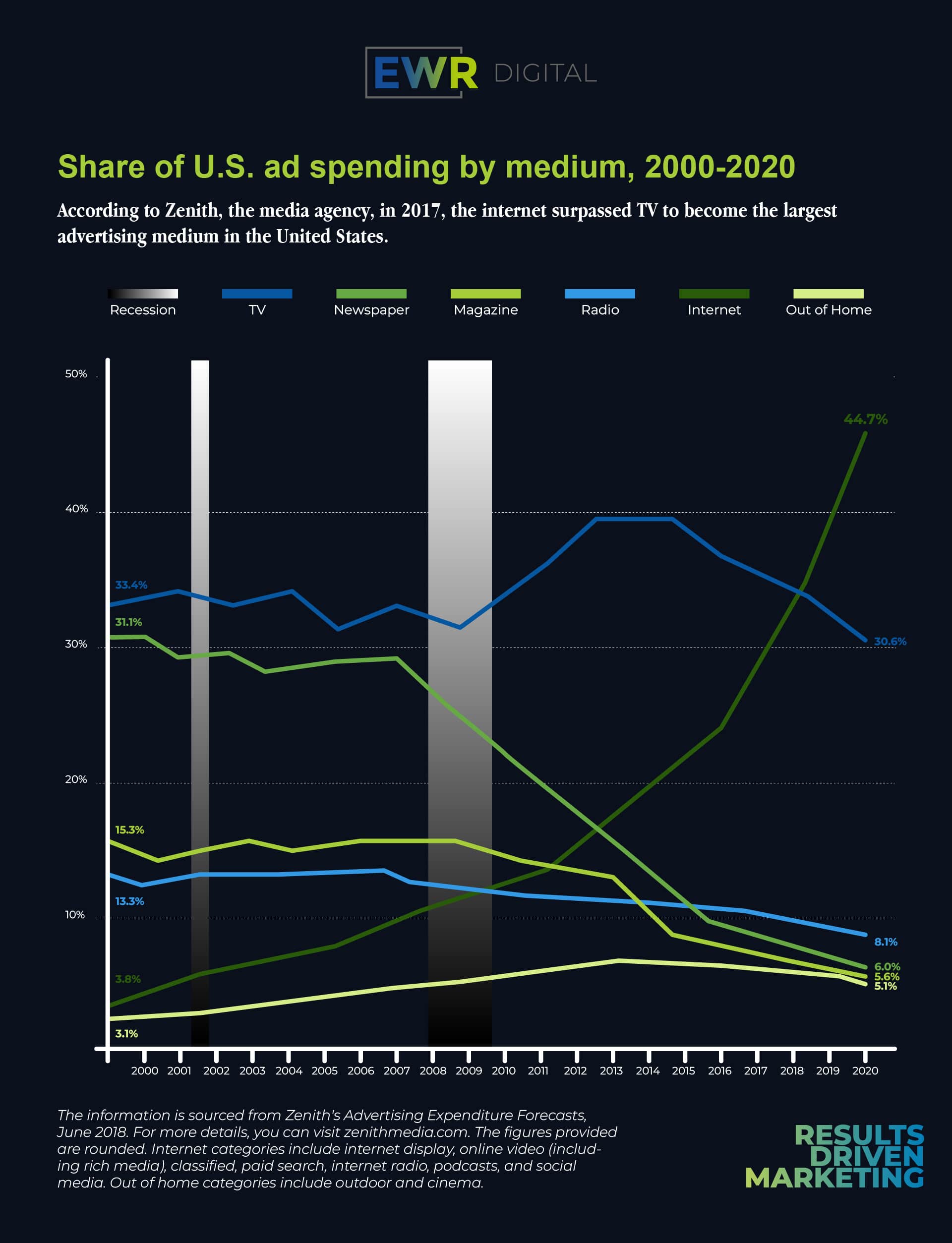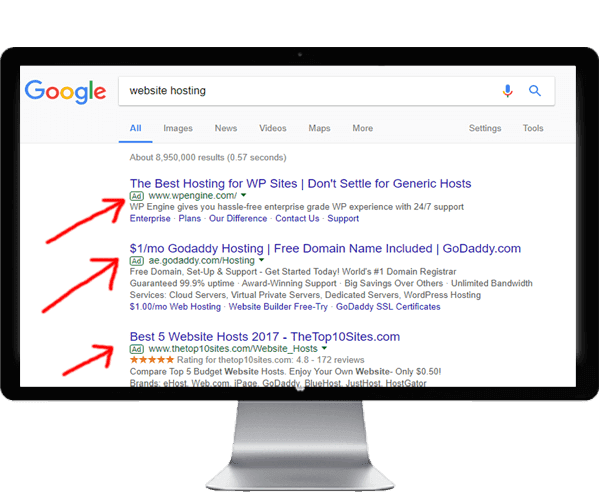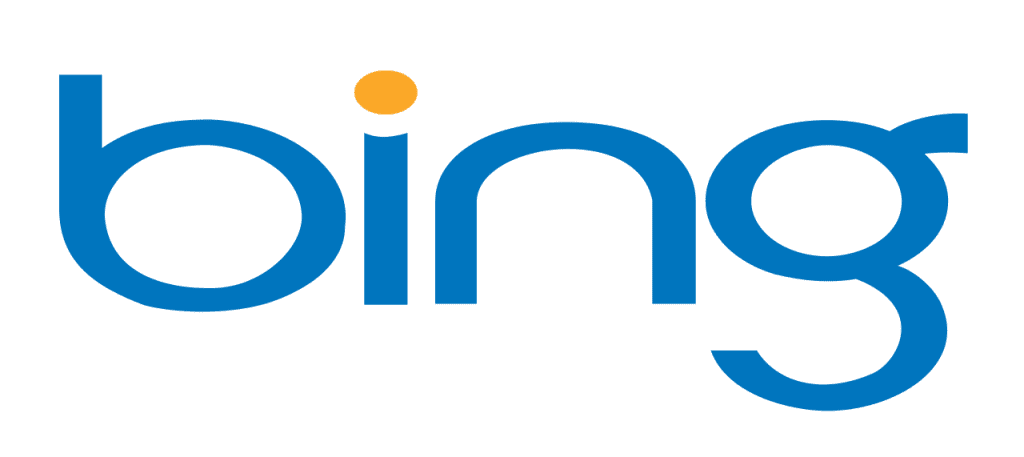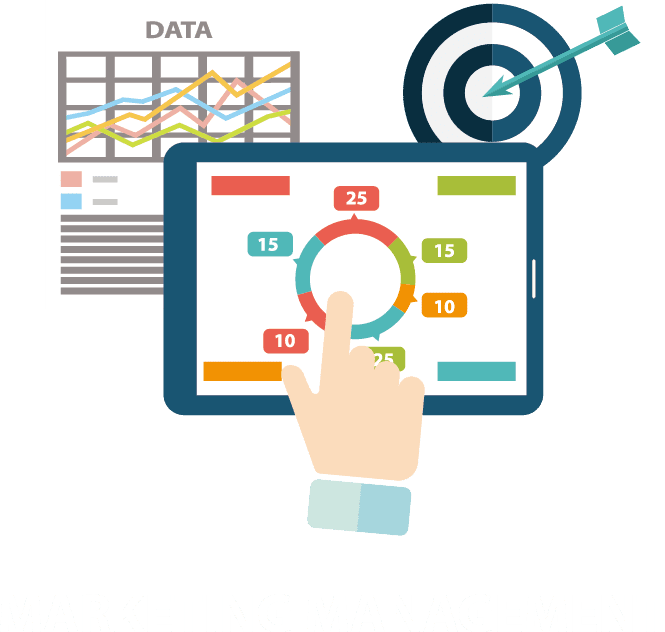
Search engine marketing is all about getting your product in front of potential customers. But there’s no point to marketing if people aren’t buying what you’re selling.
While there’s a range of methods that can help you get much needed conversions, there’s probably none more effective than PPC.
HERE’S WHAT YOU NEED TO KNOW
There was a time when serious marketing meant a willingness to “pound the pavement,” wring hands and plaster a plastic smile on your face 24/7, ’90s style.
These days, with Americans spending up to 10 hours per day on the internet, you can wring hands all you like from the comfort of your office. And you don’t even have to lift a finger (or grasp one for that matter). That’s what PPC can do for you.
AMERICANS SPEND UP TO 10 HOURS PER DAY ON THE INTERNET.
Considering this, it’s no wonder that advertisers invested over $10 billion on PPC campaigns alone.
In this article, we’ll tell you all about PPC, its relationship with SEM, why it’s beneficial for you, and how you can get started creating a PPC and Retargeting strategy that has potential customers racing to your store. Let’s dig in.
WHAT IS PPC?

PPC stands for pay per click. It is an online marketing strategy that essentially allows you to ‘buy’ visits to your website. When you use pay per click, it means that you ‘buy’ a specific keyword that is tied to your ad so that when a user searches for that keyword, they see your own ad.
If what you’re selling is as good as what you say you’re selling, when users see that ad, they’ll click on it and then do whatever it is you want them to do.
PPC is basically like running an ad in a newspaper or on television. But with one fundamental difference.
YOU ONLY PAY PER CLICK.
With PPC, you don’t have to pay for the ad every time it airs on the television or is displayed in the newspaper. Rather, you only pay when someone clicks your ad, views it or follows through to your website. So you only pay per click. Cool, huh?
PPC campaigns are run on the platforms that you think your potential customers are on. There are several platforms and several ways through which you can do this. For the sake of simplicity though, we’ll fit them all into either of two basic categories: Search Ads and Social Media Ads.
SEARCH ADS
This category of ads has its home on internet search engines such as Google, Yahoo! and Bing. But Google is so big in this space, we might have as well called the category Google Ads. Why?
Well only because Google accounts for up to 74.5% of all computer based searches with consumers making more than 160 billion searches per month on Google alone.

The way paid search works is: businesses identify certain keywords that they think indicate what people are interested in, then they bid on these keywords through ad platforms like Google Ads or Bing Ads.
If they win the bid, it means when a user makes a search that includes those keywords, it’s the business’ ad that will show in front of the user.
Don’t start to get worried about the bidding part just yet. It doesn’t mean you have to go toe to toe with huge conglomerates that have bottomless wells of cash (at least not all the time).
There are two factors that are usually considered when a bid is submitted:
- Cost Per Click (CPC) bid
- Quality Score
WHAT’S A CPC BID?
Your CPC bid refers to how much you’re willing to shell out on the keyword. This may be any amount from a few cents to as high as $10 to $20. Generally, the average cost of a keyword on Google Ads is between $1 and $2.
THE AVERAGE COST OF A KEYWORD ON GOOGLE ADS IS BETWEEN $1 AND $2.
The cost will however depend on many factors including how popular the keyword is (“insurance” is pretty popular these days), the target location of the keyword and the action you intend (clicks, impressions views).

While the big boys may be able to throw wads of cash at Microsoft Ads for the keyword they want, the requirement of a Quality Score evens up the playing field some.
This score basically assesses how useful the content you promise at the end of the click will be and rates this amongst your competitors. So if you have a small bid but massive content, you can still win the bidding war.
SOCIAL MEDIA ADS

Just as Google rules the search ads sector, Facebook is dominant here, grossing over $21 billion in US alone. That’s double the entire amount spent on newspaper advertising in 2018 and almost everything that was spent on the entire print ad category. Oof!
FACEBOOK GROSSED OVER $21 BILLION IN 2018 IN THE US ALONE.
Social media ads work pretty much the same way as search ads. You will also need to identify the keywords that indicate what people want to buy and then bid for them against other interested businesses.
It doesn’t end at the bidding table either, as bid winners are determined also by their ad quality and relevance.
HOW TO BEAT THE COMPETITION
One trick to thin out the competition here is to focus on “long tail” keywords. These keywords are usually at least 3 or 4 words in length and are less competitive. That’s mostly because they are very specific so they’re only of use to niche businesses.
But if you get your research just right, it’ll bring you all the leads you want, and then some.
Now, how does all of this fit with Search Engine Marketing (SEM)?
SEM AND PPC
SEM refers to a range of activities that businesses use to market their products to potential customers and increase the visibility of their website on search engines.
Odds are that if what you’re doing is targeted at directing steady traffic to your website and product, you’re indulging in some SEM.

While SEM was originally used as an umbrella term that covered pretty much all efforts targeted at increasing website traffic, including Search Engine Optimization (SEO), the term is increasingly being used solely in reference to paid search.
That’s where PPC comes in. It’s one of the strategies that businesses use when they engage in SEM. But unlike SEO which rarely requires paying for direct services to accomplish this, businesses must shell out regularly for PPC.
So, if SEM is the big cahuna barking out orders, PPC is the lowly underling that makes sure the job gets done.
THE ADVANTAGE OF PPC
Everybody’s taking advantage of PPC. And there are 1,001 reasons why. Not least of these is the relative cost efficiency of the strategy. The way PPC works, you are at liberty to set up a campaign that is entirely within your budget.
You don’t have to stay on hand to pay every time one of your ads is clicked. The cost will be deducted from your budget until it’s exhausted. All you basically have to do is set ‘em and forget ‘em.
ALL YOU HAVE TO DO IS SET ‘EM AND FORGET ‘EM.
But there’s way more advantage than that. Although people don’t click ads extremely often (from 2016 to 2017, 7% of people viewed PPC ads pretty dimly), when they do, you know they’re ready to buy something.
Check these stats out for size: According to Cryptovisibility, about 2/3 of people who click on Google PPC ads only do so when their search relates to purchasing products. Valve and Meter also reports that 65% of all clicks made by users that intend to make a purchase go to paid ads, with 82% preferring to search for a business near them.

And they often follow through, too. In fact, 76% of people that search for a business nearby on smartphone will visit the business within a day. This is why PPC and local SEO are so important.
In fact, PPC may be more effective, in the short run, than organic search (when a user lands on your website without clicking an ad), bringing approximately 50% more conversions than organic search, according to Wordlead.
What all of this translates to is serious value for businesses. Powertraffic reports that, on average, businesses earn $3 in revenue for every $1.60 that they spend on Google Ads.
So, while a PPC campaign will definitely cost you some money, there’s absolutely no doubt that you’ll get value for your investment, especially if you get your campaign right.
CREATING A PPC STRATEGY THAT WORKS
So there you have it. That’s as much about PPC as we can cram into this article. Just a word of advice before we let you go: while there’s no doubt that PPC is effective, it should never be the whole of your online marketing strategy. It may be great for a few months but once your budget is done, then you’re back to square one.
Rather than focus only on PPC, you’d be best served with using it alongside other activities that can help you rise in the organic rankings as well. This way, you’ll have a comprehensive marketing strategy that gives you an all-round boost.
GET PPC THAT WORKS FROM EWR DIGITAL
Now that you know how PPC works and what you stand to gain from it, your next step should be to ask: How can I make PPC work for my business?
If you need help answering this question, then don’t hesitate to reach out to us. At EWR Digital we partner with businesses like yours to ask and answer the big questions and develop online marketing strategies that work. You can call us at 713-592-6724 or check us out at our website to learn more.
What You Need to Know About the Connection Between SEM and PPC | EWR Digital – Houston, TX




